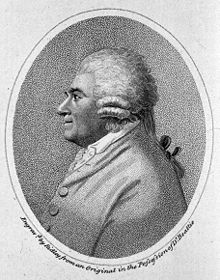James Beattie
Scottish poet, moralist and philosopher (1735-1803)
Professor James Beattie (October 25, 1735 – August 18, 1803) was a Scottish scholar and writer.

Quotes
edit- When squint-eyed Slander plies the unhallow'd tongue,
From poison'd maw when Treason weaves his line,
And Muse apostate (infamy to song!)
Grovels, low muttering, at Sedition's shrine.- The Judgment of Paris (1765), stanza 109.
- Every man of learning wishes, that his son may be learned; and that not so much from a view to pecuniary advantage, as from a desire to have him supplied with the means of useful instruction and liberal amusement.
- "Remarks on the Utility of Classical Learning" (written in 1769), published in Essays, Vol. II (1776), p. 524.
- Laws, as we read in ancient sages,
Have been like cobwebs in all ages:
Cobwebs for little flies are spread,
And laws for little folks are made;
But if an insect of renown,
Hornet or beetle, wasp or drone,
Be caught in quest of sport or plunder,
The flimsy fetter flies in sunder.- The Wolf and Shepherds (1776).
- What is a law, if those who make it
Become the forwardest to break it?- The Wolf and Shepherds (1776).
The Minstrel; or, The Progress of Genius (1771)
edit- Ah, who can tell how hard it is to climb
The steep where Fame’s proud temple shines afar?- Book i. Stanza 1.
- Though richest hues the peacock's plumes adorn,
Yet horror screams from his discordant throat.
Rise, sons of harmony, and hail the morn,
While warbling larks on russet pinions float;
Or seek at noon the woodland scene remote,
Where the gray linnets carol from the hill:
O let them ne'er, with artificial note,
To please a tyrant, strain the little bill,
But sing what heaven inspires, and wander where they will.- Book i. Stanza 5.
- Wilt thou debase the heart which God refined?
No; let thy heaven-taught soul to heaven aspire,
To fancy, freedom, harmony, resigned;
Ambition's groveling crew forever left behind.- Book i. Stanza 7.
- Zealous, yet modest; innocent, though free;
Patient of toil, serene amidst alarms;
Inflexible in faith, invincible in arms.- Book i. Stanza 11.
- Old age comes on apace to ravage all the clime.
- Book i. Stanza 25.
- To the pure soul by Fancy's fire refined,
Ah, what is mirth but turbulence unholy,
When with the charm compared of heavenly melancholy.- Book i. Stanza 55.
- Mine be the breezy hill that skirts the down,
Where a green grassy turf is all I crave,
With here and there a violet bestrewn,
Fast by a brook or fountain’s murmuring wave;
And many an evening sun shine sweetly on my grave!- Book ii. Stanza 17.
The Hermit
edit- At the close of the day when the hamlet is still,
And mortals the sweets of forgetfulness prove,
When naught but the torrent is heard on the hill,
And naught but the nightingale’s song in the grove.
- He thought as a sage, though he felt as a man.
- But when shall spring visit the mouldering urn?
Oh when shall it dawn on the night of the grave?
- By the glare of false science betray’d,
That leads to bewilder, and dazzles to blind.
- And beauty immortal awakes from the tomb.
- 'Tis night, and the landscape is lovely no more;
I mourn, but you woodlands I mourn not for you!
For spring is returning your charms to restore,
Perfumed with fresh fragrance and glittering with dew.
Nor yet for the ravage of winter I mourn,
Kind nature the embryo blossom shall save;
But when shall spring visit the mouldering urn?
- Ah! when shall it dawn on the night of the grave!